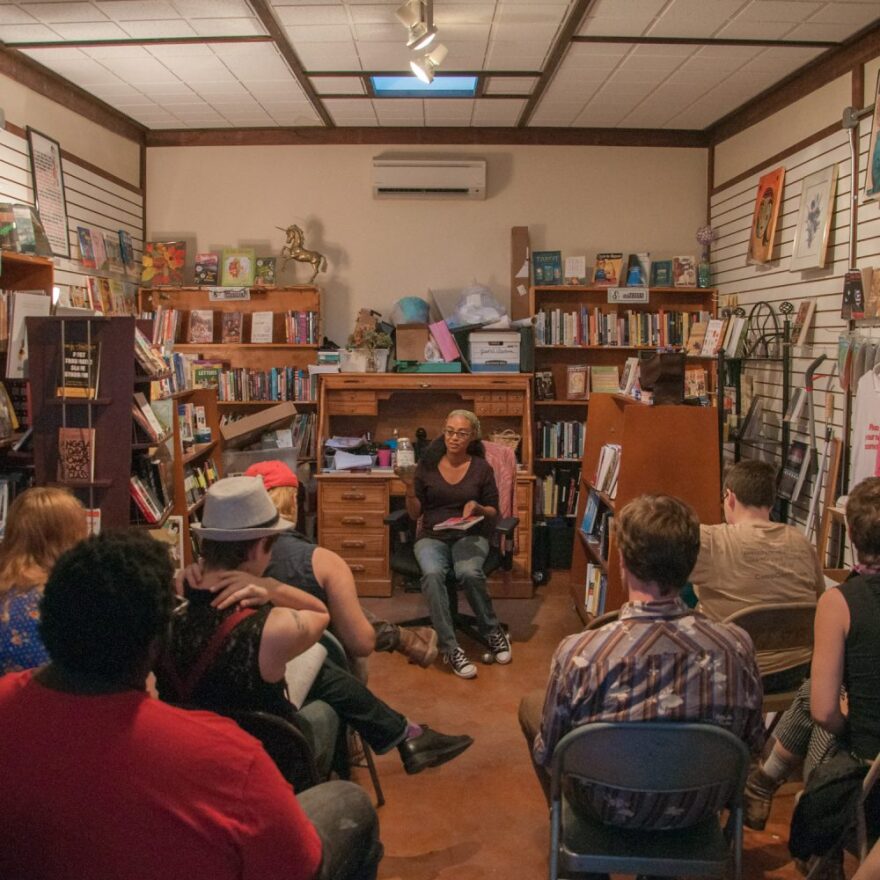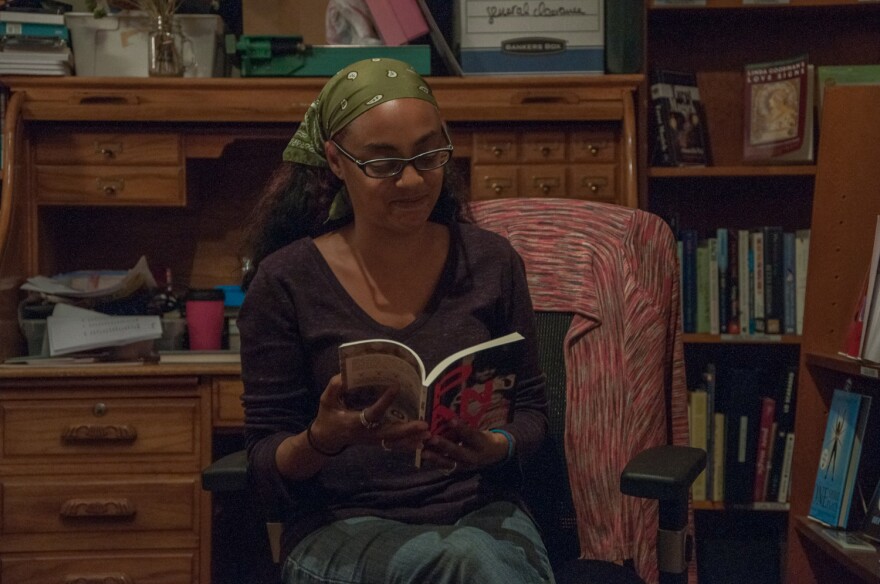Scrolling through the Southern Indie Bookseller’s Alliance’s list of board members, Erica Rodriguez Merrell's photo stands out.
While the other members’ pictures are cropped tightly to their faces, smiling pleasantly at the camera, Rodriguez Merrell chose a full-body shot, her legs thrown over the arm of one of the many brightly colored patio chairs outside of Wild Iris Books, the downtown feminist bookstore she co-owns and runs.
Her grin is cheeky and delighted, and she wears rainbow socks.
Then there’s her self-description.
“Once upon a time in a land far, far away,” it begins, her voice a break from the restrained, official tone of her peers, “actually in the late 70’s in Connecticut, a baby girl was born."
The biography goes on to sketch out her history, adding that she’d lived in five states by the time she was 18. She eventually went to college in upstate New York then settled in Miami, working at Borders.
But for the past 11 years, she and her husband have lived in Gainesville. It's the longest she’s stayed in one place, and she doesn’t plan to leave any time soon.
She has become a vital member of Gainesville’s community. She works as a bookseller, co-running Wild Iris downtown. She’s been keeping books and a business up and running since running the Miami Borders. She can do those tasks in her sleep, she said. She knows her inventory so well, she said, that off the top of her head she could tell you if they have the book you’re looking for.
Over the course of her six years with Wild Iris, she’s accrued the additional ambient roles of community organizer, mentor, facilitator, advocate and friend to anyone who wanders into the courtyard behind Wild Iris.
“I feel very strongly about this threshold,” she said, gesturing to the archway connecting the courtyard to the outside world.
Stepping through there, she said, should feel like coming home.
“I like to think that people have little holes in them,” she said. “And I have a bunch of extra love. So I’m just going to go and plug in your holes while you’re not looking. That’s my job.”
Rodriguez Merrell and her team organize feminist support groups, women of color brunches and barbecues with the sole purpose of celebrating trans womanhood. Most recently, they launched a weekly series called “Feminist Vents,” where women gather to drink wine or coffee and talk about micro-aggressions they experienced throughout the week.
But her bio says it best. She left corporate bookselling to take on the volunteer-run Wild Iris and the non-profit world for a specific purpose: to “wield her powers for good against the modern day dragons of oppression and inequality.”
---
Wild Iris was founded in 1992, functioning as it does now, as a cross between a bookstore and a community space.
Two second-wave lesbian feminists founded the store, which began by focusing exclusively on the experiences of those who identified as cis-gender and lesbian.
This corresponded with the general environment of the early '90s, when feminism was beginning to develop its third wave.
Intersectionality, the idea that influencing factors like race, class, gender and sexuality are essential to understanding oppression, was becoming widely discussed by academics and activists, such as bell hooks, Audre Lorde and Patricia Hill Collins. Until intersectionality reoriented the focus and widened the net of feminism, the movement focused primarily on cis-gendered white women.
“One thing I try to remind people is that when this space was an exclusive, kind of separatist lesbian space, it’s because (the world) was not safe,” Rodriguez Merrell said. “People were just trying to be out.”
Feminist bookstores began to die in the early 2000s with the rise of large-scale booksellers like Barnes and Noble and Books-A-Million. They dealt blows to niche stores like Wild Iris by offering a wider selection and competitive prices.
Amazon later felled the larger sellers – Borders filed bankruptcy in 2011 – for identical reasons, killing off more and more feminist bookstores.
There are only 12 left in the United States and Canada. Wild Iris is the last in Florida, Rodriguez Merrell said.
“I realize that I’m one of the people keeping that number from dropping to 11,” Rodriguez Merrell said. “I can’t let that happen.”
When Rodriguez Merrell took the reins in 2009, she guided the store headlong into the intersectional bracket.
When the store moved downtown in 2012 from its old location on the corner of University Ave and NW 10th Street, Rodriguez Merrell and co-owner Cheryl Calhoun, who mostly runs the website, revamped the entire catalog, adding books addressing issues of queer women, trans women and women of color.
Rodriguez Merrell has become a local champion for intersectionality, which prompted the University of Florida's Diversity Affirmation and Awareness Committee, a group of psychology graduate students devoted to teaching inclusivity and equality, to invite her to give a talk in February, according to Alex Lanzen, one of the committee's chairs.
"My co-chair saw what she was doing in the community," she said. "We thought to bring her in for a discussion."
Rodriguez Merrell converted events like the weekly feminist open mic into a queer open mic and ended the exclusive, lesbian-only dance parties. She helped launch a bi-weekly event called Free Store, which crowd sources, and offers free of charge, supplies like clothes, underwear, makeup and tampons for anyone who needs them, which has been especially helpful for those transitioning and taking on the fiscally daunting task of converting their wardrobe.
“I fancy myself a Robin Hood in my brain,” Rodriguez Merrell said. “’How can I steal all the resources and give them to you?’ is really my end goal in everything.”
Though the business still operates on a shoestring and continues to struggle to stay in the black, this year’s holiday sales were the best they’ve ever been, according to Rodriguez Merrell. The transition has not only made Wild Iris a more inclusive, active space, but has brought it a gust of success. They crammed about 200 people into the Courtyard this April for the “Viva La Vulva” art gallery.
Wild Iris is the only bookstore remaining downtown since Broken Shelves closed earlier this year.
Part of the appeal is that Wild Iris does more than sell books. Rodriguez Merrell intentionally cultivates safe, welcoming and inclusive space. This sometimes takes the form of Rodriguez Merrell acting as confidante. She’s made herself available and open to anyone who needs emotional support.
Once, she said, a woman whom she had never met came into her store, walked up to the counter and confessed that she was married and had children but was in love with her best friend, a woman, and she didn’t know what to do.
Rodriguez Merrell directed her to the Gainesville Pride Center, which offers counseling and a community. She said listening and providing support helped the woman begin to navigate the process of recognizing her sexuality.
Her customers and staff respond to this care with fierce loyalty. Many of the younger customers get converted into the battalion of unpaid interns.
“When I started, I was very nervous,” said 22-year-old former intern Nina Plocek. “I wasn’t really confident in my knowledge about feminism yet, which is interesting because I’m studying women’s studies.”
Plocek said Rodriguez Merrell provided a comfortable learning environment and taught her to have a sensitive, open mind when it comes to understanding oppression and struggle.
“I think she’s a good example for how to be a good ally and someone who is considerate of many viewpoints in the community,” Plocek said. “She’s a mentor for a lot of us.”


